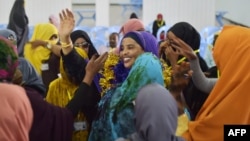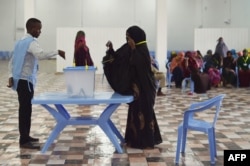Somalia has sworn in the members of a new parliament following a process marred by irregularities and charges of corruption. But it is delaying its presidential election for a fourth time, likely until late January.
Tuesday’s swearing-in ceremony in Mogadishu saw 281 members of the upper and lower houses of parliament take office. VOA stringers in the city reported that security forces conducted stepped-up patrols in the streets during the inauguration.
Independent regional analyst Abdiwahab Sheikh Abdisamad said the swearing-in heralded the beginning of a new era.
"The new members of parliament, almost 45 percent of them are former members of parliament, while 55 percent are new young, energetic and educated people," he said, adding that for the first time, a "significant number" of the new members are women.
Mohamed Osman Jawari, speaker of the outgoing parliament, formally proclaimed the handover of power to just the second new group of Somali lawmakers in 25 years. The new members "have been sworn in and from now on they are in charge of the country’s legislative responsibilities,” he said.
Security, logistical issues
Somalia was unable to conduct direct nationwide elections because of security and logistical problems. Instead, the members of the upper and lower chambers were elected by some 14,000 "special delegates" who in turn were chosen by clan leaders and regional representatives. The president will now be elected by parliament.
That vote had been scheduled to take place on Wednesday, but electoral commission officials told VOA's Somali service the vote has been postponed to Jan. 24. The commission has yet to announce the date publicly.
Critics say the parliamentary selection process was marred by vote buying, violence, and intimidation. The electoral commission says it is redoing the elections for five posts because of these irregularities. The commission said at one point that it would redo 24 races but then dropped the number back to five. Other seats are still vacant as clan leaders have not yet decided on the candidates.
The Somali auditor general told VOA earlier this month that some candidates paid from $5,000 to $30,000 to get elected to parliament.
The inauguration was welcomed as an important step forward in a joint statement issued by the United Nations, United States, Britain, African Union and the European Union. But the international community also expressed concerns about a last-minute decision to add 18 seats to the upper house.
Somalia’s National Leadership Forum announced the additional seats on Saturday. The decision contradicts the constitution which limits the upper house to 54 senators.
Professor Mohamed Ali Kalay, the chancellor of the University of Southern Somalia in Baidoa, suggested that some of the presidential candidates have been trying to use the election process to reward supporters.
“Paying salaries of 275 MPs is already hard. They have also created 54 seats for senators and now they have added up to 18 more senators. It’s not even clear what those people’s roles will be. This is not sustainable,” he said.
Current president Hassan Sheikh Mohamud is a member of the National Leadership Forum. He is running for re-election against six challengers.
Afyare Abdi Elmi, a professor of international affairs at Qatar University, said the new parliament cannot bring hope to Somalia unless it proves to be different from the previous parliament, which he said as troubled by corruption and other problems.
“I cannot see a turning point that the country inaugurates a new parliament. But it depends on how effective its members become and where they lead the nation through their legislative work ahead,” Elmi told VOA Somali.





